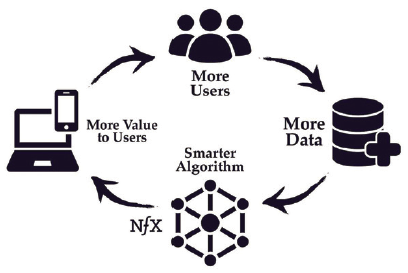Platform businesses enrich our lives in the era of platform capitalism by providing various services. However, both customers and workers who participate in the platforms suffer various problems. Since the Korea Development Institute announced a proposal to strengthen the protection of platform workers on August 23rd, the issue over platform business has been reignited. Thus, the Sungkyun Times (SKT) will examine the complex nature of platform businesses and their potential solutions.
From Pipeline to Platform
-Defining Platforms
Today, the term platform is frequently used in its software-based meaning that refers to a specialized environment for business operations. Before the development of platforms, companies were mainly driven by pipeline business, a linear mechanism for constructing a value chain and controlling the chain internally to generate profits. However, with the advent of the Internet, the pipeline industry has gradually evolved into online platforms. The segmented value chain has been connected complicatedly to create a value network. This evolution has given rise to platform operators who act as intermediaries between demand-side and supply-side customers. These entities from both sides meet on online platforms, resulting in non-linear interactions. With the arrival of hyper-connectivity, algorithms have started to be integrated into platforms, allowing them to effectively analyze input data and apply inherent rules through programming. Finally, the development has led to a zero-click economy. Zero-click refers to a phenomenon that enables Internet users to experience various services without having to click a button. In short, the core foundation of the platform business is mediating a two-sided market of providers and customers. In 2022, McKinsey, a worldwide research organization, predicted that platform enterprises will account for 30% of international corporate revenue by 2025, indicating that the previous economy paradigm shifted to a new platform model.

-How to Classify Platform Businesses
Platform SME Research Center specifies several platform industry structures based on the type of firm. The first is a business type, which focuses on material products and services involving financial interactions. Therefore, gaining the trust of platform participants is critical. For instance, food delivery platforms such as Coupang Eats interconnect consumers and riders while forming systematic delivery procedures and client services that enhance reliability. The second type is technology-based, which is characterized by promoting innovation in existing goods or services through platforms. Google and Apple are the leading examples of such companies. The two companies provide innovative infrastructure, namely mobile operating systems, that can be used by all participants in two-sided markets. Furthermore, such companies play a significant role in creating a digital ecosystem for computers or smartphones. Finally, the hybrid type implements platforms that combine business and technology. Examples include Toss and NHN PAYCO, the two main enterprises that have created financial business platforms through financial technology (FinTech). They have also stood out for establishing a startup ecosystem by leading cashless payments for everyday life.
Platform Business, the Two-Sided Coin
-Innovative and Positive
1. Just Go with the Platform
The growth of platform business has accelerated the phenomenon known as the “big blur,” which means breaking down boundaries between industries. A representative example of this is Kurly, a food delivery agency that combines e-commerce data and fulfillment data for logistics outsourcing. Such a blur has resulted in gathering various data; for example, using search engines from different fields enabled the delivery of highly customized services to consumers. However, customers may seek out platforms that better align with their needs or become multi-homers by using multiple platforms simultaneously. This implies that platform firms must constantly provide differentiated services to their consumers, further contributing to their outstanding standard of living. These positive trends also apply to platform workers. For instance, an artificial intelligence (AI) service in Baedal Minjok, a Korean food delivery company, recommends the best delivery call for riders based on data such as pickup and delivery time from a single order.
2. Network Becomes Powerful

The emergence of platforms has altered the prior market arrangement into a two-sided market, allowing a cross-network effect within companies. A cross-network effect refers to the virtuous circle where the usage of a product or service leads to an increase in demand, which then creates further demand. For platform firms to fully experience the synergy of such an effect, they must maintain the demand from early consumers. For example, the Apple App Store connects users who want to purchase applications and developers who want to sell their applications. Apple, which already has secured a loyal customer base via its products, is considered a market that ensures profit for app developers. Therefore, companies that have reached a certain threshold of consumer demands can benefit not only from consumer gains but also from participants on the platform.
-Manipulative and Biased
1. Puppet of the Platform
Sophisticated personalized services are an appealing tool for their efficiency. However, there is an underlying issue of losing control over personal data ownership. According to a 2022 investigation by the Personal Information Protection Commission, even global tech giants such as Google and Meta did not obtain legal consent for collecting user information. The issue provoked further concerns since it exploited the data to customize internet commercials and gained revenue without the users’ permission. In addition, when problems occur within the process of earning personal data, the subject of responsibility becomes ambiguous as various individuals handle personal information within the platforms. Thus, it is especially controversial to discern between the two responsibilities of each online platform owner and supplier. Meanwhile, platform companies’ news distribution process has raised suspicions of intentionally exposing certain news through algorithm manipulation. In fact, Naver was accused of manipulating the article rank after receiving a request from the Korea Football Association in 2017, and such suspicions still persist today. To make matters worse, this is not a problem exclusive to Naver but rather a problem that remains unsolved throughout every platform that utilizes algorithms.
2. Unfair Labor Exchange

Another concern is the lack of transparency regarding the algorithms used in platform workforce management. Those involved in online platforms, such as Baedal Minjok and Kakao Driver, are not directly regulated by the platform company but are indirectly evaluated through algorithms within the platform, such as rating. In the case where the mechanics of these algorithms are not transparently disclosed, workers often suffer from disadvantages as their job assignments are determined based on evaluations on the platform interface. In addition, platform workers lack labor rights protection due to the ambiguity of their business contracts with the company, unlike employees under contracts covered by the Labor Standards Act (LSA). Platform workers have a contract with the platform firm as clients who participate in the platform workspace and establish business contracts with platform consumers. However, it is difficult for platform consumers to obtain prior information on platform workers, and platform workers face similar challenges. Thus, the debate revolves around whether the employment contract between platform workers and companies can be considered fully established. In this regard, expert C at the Economic, Social and Labor Council (ESLC) told the SKT, “The current labor law, which is centered on employees, has limits in adequately protecting platform workers.”
A Call for Transparency and Labor Rights
-Fair and Clear

Using the MyData model within the platform business will clarify control of personal data ownership. MyData, according to the Korea Data Agency, is a new paradigm in personal data usage that states the right to manage and use personal data while ensuring individuals’ right to self-determinate their data. In Korea, these services have proven their efficiency in the finance business by emphasizing that individuals’ data is only utilized with explicit agreement. Kim Sang-yoon, a commissioner of the World Economic Forum Global told the SKT, “The MyData industry will make clear the responsibilities of platform businesses that handle personalized information and create beneficial synergies when combined with business-to-consumer industries.” Furthermore, given the absence of the Personal Information Protection Act that considers the characteristics of the platform businesses, clarifying the subject that is responsible for the management of personal information is necessary. On the other hand, when it comes to news platforms, efforts should be made to imprint various information connected to the automatic arrangement of algorithms on an ongoing basis. For instance, the Algorithm Tips Website by the Computational Journalism Lab of Northwestern University provides algorithm libraries and helps individuals understand the algorithmic elements of their everyday lives. News platform firms should also have a mechanism to inform consumers about which specific functions within their platforms use complicated algorithms to make them aware that they are receiving automated services.
-Protecting the Rights of Platform Workers
Platform companies should address issues caused by algorithms used in firm management by providing platform workers with crucial knowledge of algorithm evaluation criteria, customer satisfaction, and more. In 2017, UNI Global Union published its Top 10 Principles for Worker’s Data Privacy and Protection, which are also highly relevant in protecting platform workers’ rights. The principles assert that workers’ access to data should be improved to emphasize transparency in how their data is utilized. They also explain that the opportunity for labor negotiation must be provided regarding data security. If UNI’s principles are applied to platform labor, they can help solidify information rights protection for platform employees. In addition, platform personnel must be able to respond immediately to queries in a way that does not infringe upon the commercial confidentiality of the company. Furthermore, new legislation that protects platform workers is required, and a firm social protection network should be designed. In Germany, several platform firms and the industrial union IG Metall have collaborated to develop a 10-point code of conduct for crowdsourcing platform companies. Korean platform companies should similarly enhance their responsibilities to safeguard platform workers. In 2018, the International Labor Organization created a new category of dependent contractors, which is another term for platform workers, signaling that they should be identified and acknowledged as workers. Regarding the issue, expert C explained to the SKT that, “The essential human rights protected by labor law should also apply to platform workers. The government must identify platform employees and recognize their worker status to protect them appropriately.”

The emergence of platforms has ushered in a new economic paradigm, which has led to the creation of tremendous monetary value. However, it is crucial to consider the dark side of platform businesses. Only through these active discussions will platform businesses be able to take a step forward.
